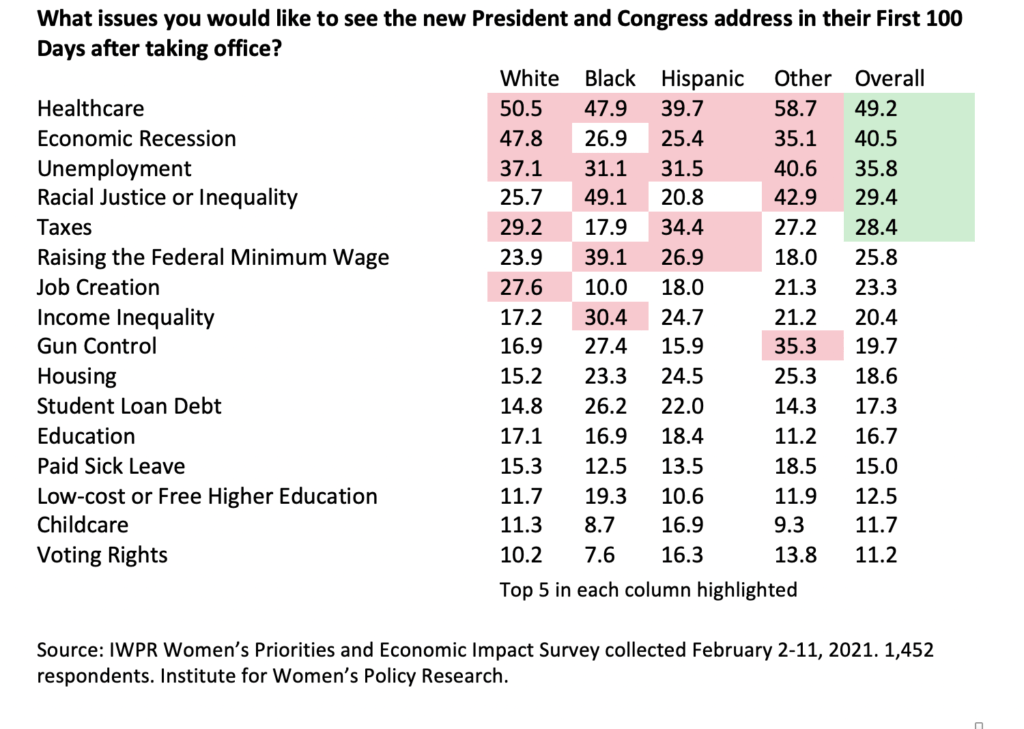FOR IMMEDIATE RELEASE
February 23, 2021
Contact: Erin Weber | 646-719-7021| weber@iwpr.org
Washington, DC—New National Survey by IWPR finds in first 100 days and beyond, affordable, high-quality healthcare, getting the economic recession under control, and job creation are top priorities for women for the new Administration and Congress. Raising the minimum wage and taxes round out top five priorities. A great majority also support paid sick leave.
The top priorities for women are highly influenced by their experience during the pandemic, the economic downturn, and their inability to make ends meet or find work.
Women have been most affected by the COVID-fueled economic downturn. Employed in the hardest-hit sectors — education, hospitality and leisure, healthcare, and service — more than 11 million women have lost their jobs and another 2.65 million have left the workforce since February due to caretaking demands or an inability to find work.
Survey Highlights:
- One in four women (26.6 percent) report that their families are worse off financially than they were a year ago. Nearly three in ten (29.8 percent) of Latinas report that their family finances are worse off compared with the start of 2020.
- Overall, almost one half of women are either “very worried” (23.7 percent) or “somewhat worried” (24.0 percent) about their total family income being enough to pay all their bills. Concern is much higher among Latina women with two out of three (66.6 percent) women reporting worry about having enough income to meet family expenses.
- Since the start of the pandemic, 50.4 percent of women said they stopped working or reduced their hours because of care-taking demands.
- Across race and ethnicity, 69 percent of women surveyed support paid sick and time away from to work to have a child, recover from serious health conditions, or to care for a family member.
- The top five priorities for Women for the New Administration and Congress include Healthcare, the Economic Recession, Unemployment, Raising the Minimum Wage, and Taxes.
- One in four women (25.2 percent) report that during the pandemic they needed to take time off from work but did not. Rates were highest among Latinas and Black women.
- About 20 percent of women with children percent of women want to see the new president and congress address childcare and education in their first 100 days.
Women’s Top Policy Priorities for Biden Administration and Congress
- Healthcare is First on the List of Priorities for Women: Nearly a year into the pandemic, close to 50 percent of women ranked affordable, high-quality healthcare as the number one priority for the Biden Administration, followed closely by the economic recession (40.5 percent) and Unemployment (35.8 percent).
- Improving Economic Conditions: Women are looking for policies and solutions aimed at improving their economic conditions and to alleviate the suffering caused by the Economic Recession: 40.5 percent of women surveyed said rebuilding the economy was among their top five priorities along with stemming unemployment (35.8 percent) set off by stay-at-home orders and efforts to slow the spread of COVID-19.
- Racial Justice or Inequality: Black women are looking for policies aimed at improving Racial Justice or Inequality (their most mentioned priority — 49.1 percent) and Income Inequality (30.4 percent of Black women included in their top five priorities). Among white women, only about quarter. believed racial justice or inequality to be a high-ranking priority. 1 in 4 of Latino women believed racial justice or inequality to be a priority.
- Raising the Minimum Wage: Black (39.1 percent) and Latina women (26.9 percent) would like to see an increase in the federal minimum wage. Both groups are over-represented among women workers in lower-wage jobs and occupations.
- Taxes rounded out the list of top priorities for women with 28.4 percent identifying it as a top issue. Among women surveyed, Latina women and White women were more likely to see taxes as a key priority, 34.4 percent and 29 percent, respectively. The Earned Income Tax Credit (EITC and the Childcare Tax Credit are important issues for working women and families.

“The experiences of women during the pandemic with job losses, increased caretaking responsibilities due to school and daycare closures, and economic hardship means they should take the lead on helping define policy priorities and strategies for an equitable recovery,” said C. Nicole Mason, PhD, President and CEO, Institute for Women’s Policy Research.
“Short and long-term relief and recovery strategies should focus on job creation in hardest hit sectors, and economic and social supports for women who will not be able to immediately return to the workforce.”


